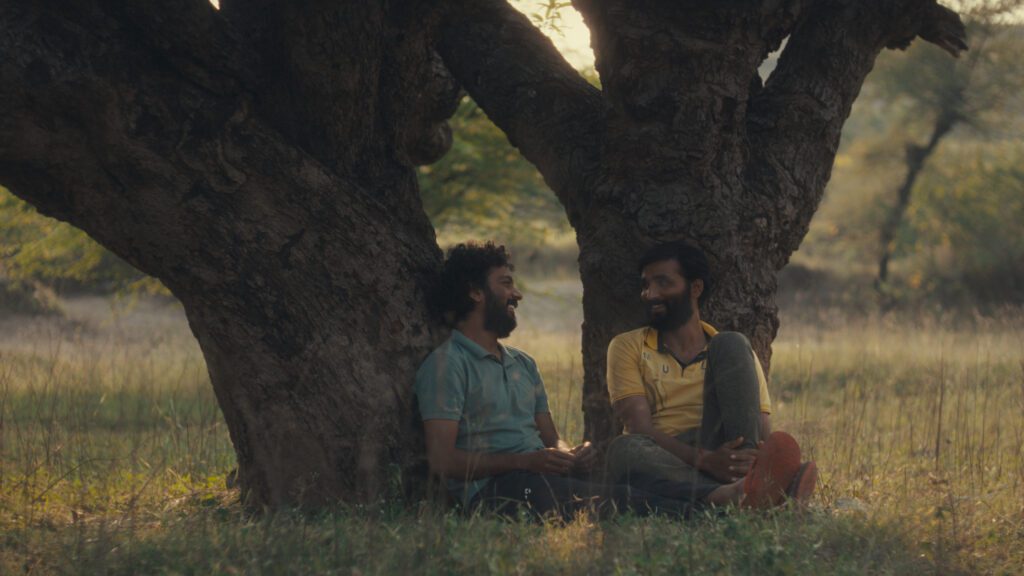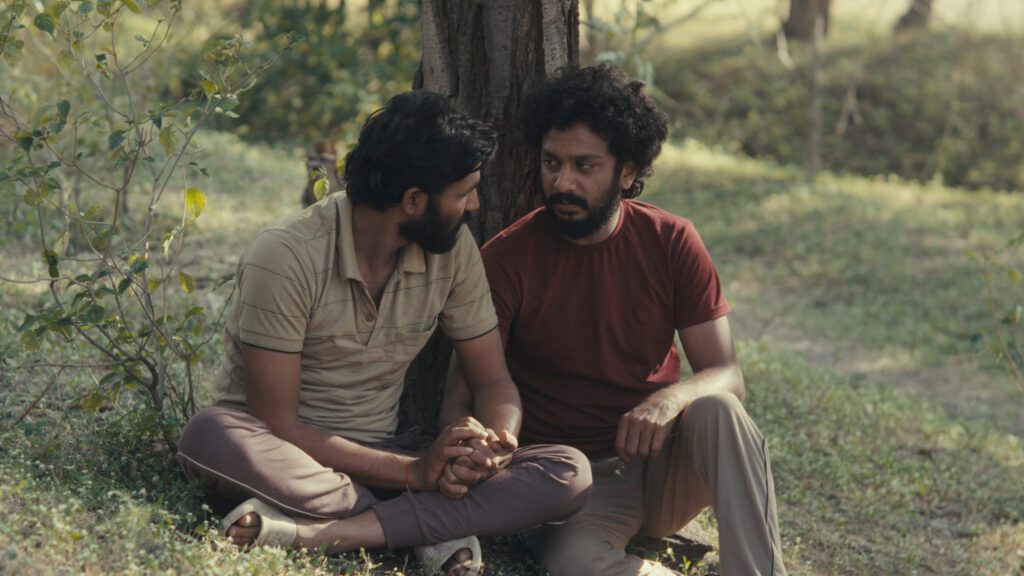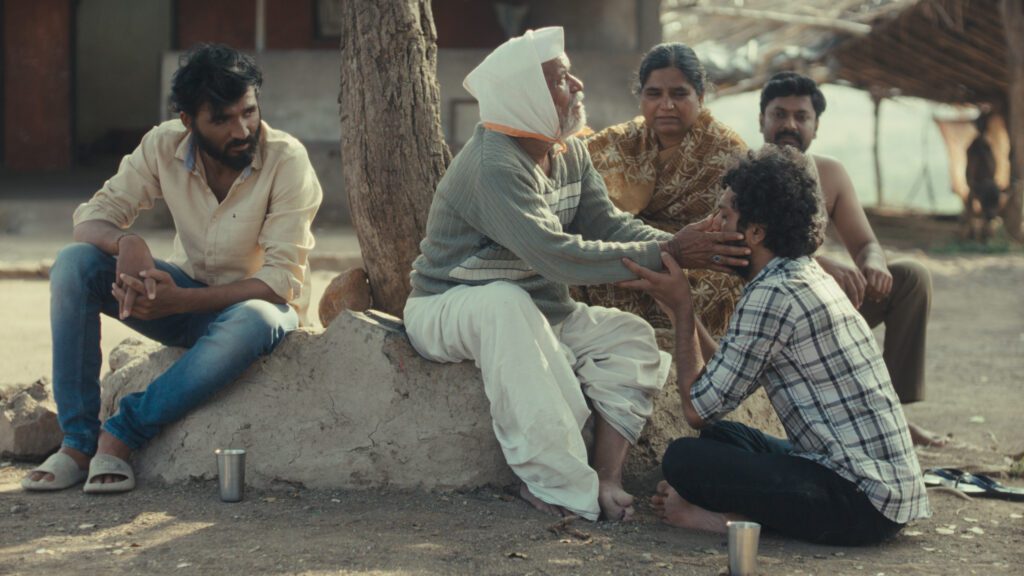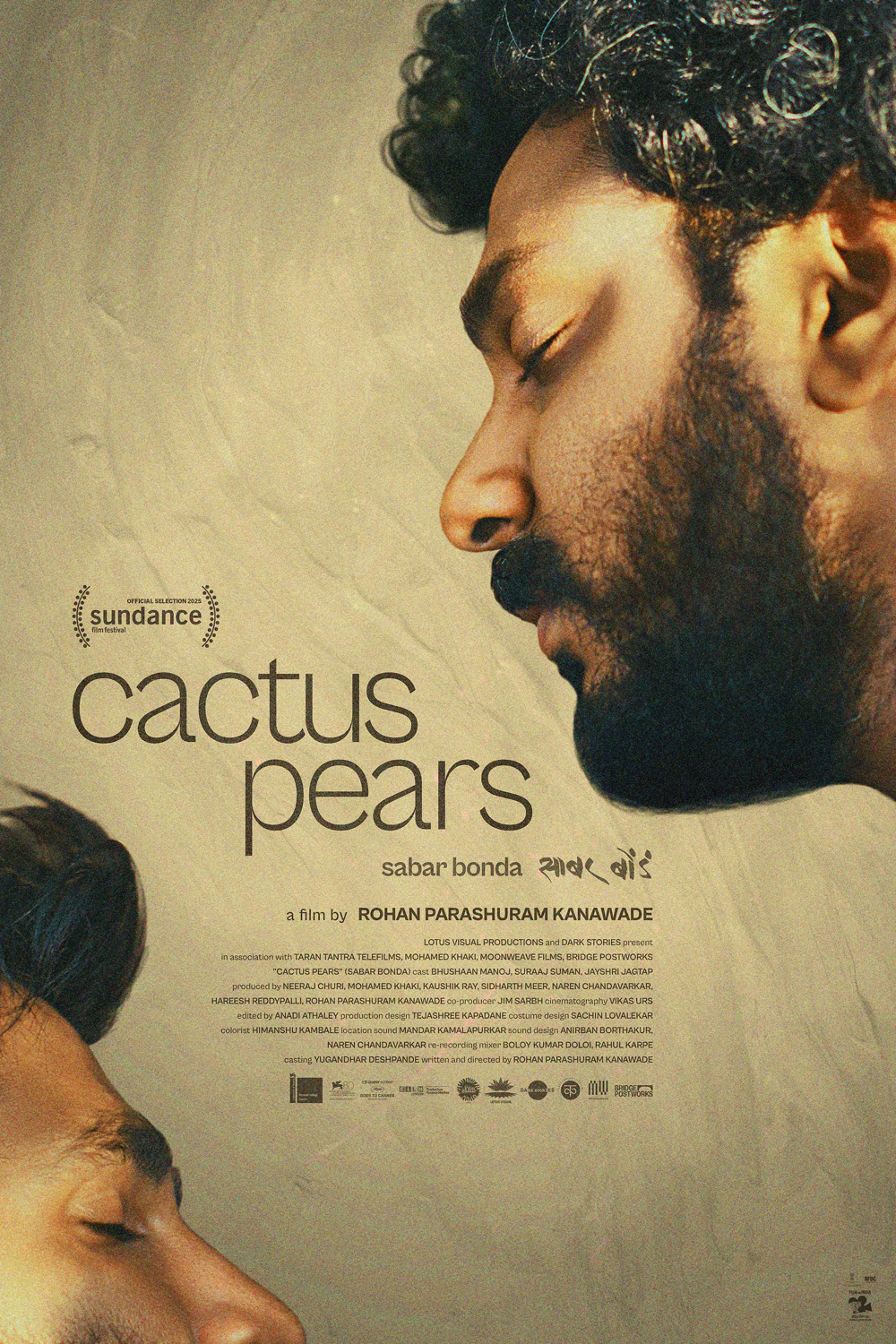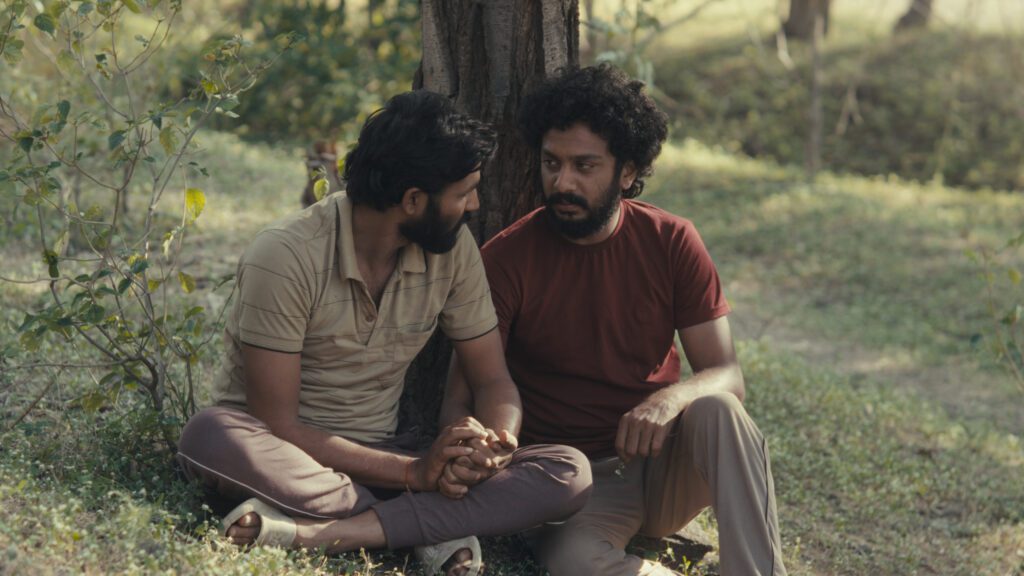
Cactus Pears
仙人掌梨
罗翰·帕拉舒拉姆·卡纳瓦德
Rohan Parashuram Kanawade
2025|酷儿新声 Queer New Voice
阿南德(30岁)是孟买的一名呼叫中心职员。应母亲苏曼(50岁)的要求,他不得不回到祖籍村庄,为去世的父亲守丧十日。火葬仪式后,哀悼期刚开始,亲戚们便开始以“至少让母亲看到他成家立业,多少能得些安慰”为由,微妙而持续地催促他结婚。阿南德感到窒息,因为若在此时向家族出柜,可能会让母亲在最需要亲戚支持的时候被孤立。
他在童年好友巴尔亚(30岁)身上找到了慰藉。巴尔亚每日进山放羊,阿南德便常伴随其行。巴尔亚也正面临家庭对其性取向的压力,他以“受过教育的女孩都看不上农民、偏爱城里人”作为借口,长期保持单身。为逃避各自的压力,两人开始频繁相处。他们出身迥异,却因共同的童年记忆与相似的挣扎而重新连结。随着日子推移,他们的情感与身体愈发亲近。
当哀悼期即将结束,他们新生的情愫能否超越这十天?
《仙人掌梨》探讨了在压力之下滋生的微妙情感纽带,以及它们可能的未来。
Anand (30), a call-center employee in Mumbai, is forced to spend ten days at his ancestral village to mourn the loss of his father at the behest of his mother, Suman (50). As the mourning period begins post-cremation, he faces subtle but relentless badgering from relatives to get married so that at least his mother finds the pleasure of seeing him settled. Anand finds himself stifled, as coming out to extended family could alienate his mother from the relatives when she needs them the most. He finds solace in his childhood friend, Balya (30), as he accompanies him on his daily outings into the mountains to herd goats. Balya has been using the ‘educated girls favoring city-dwellers over farmers’ as a ruse to stay unmarried as he undergoes similar pressures relating to his sexuality from his family. To escape their pressures, the two men spend time together. Hailing from different worlds but bound by childhood memories, they connect over their common struggle. As the days pass, their intimacy blooms emotionally and physically. With the mourning period ending, will their burgeoning bond survive beyond the ten days? Sabar Bonda (Cactus Pears) explores the delicate bonds that develop under duress and the future of it.
导演:罗翰·帕拉舒拉姆·卡纳瓦德
编剧:罗翰·帕拉舒拉姆·卡纳瓦德
主演:布尚·马诺杰、苏拉杰·苏曼、杰什里·贾格塔普
制片人:尼拉杰·丘里、穆罕默德·卡基、考希克·雷、纳伦·钱达瓦卡、西达尔特·米尔、哈雷什·雷迪帕利、 罗翰·帕拉舒拉姆·卡纳瓦德
摄影:维卡斯·乌尔斯
类型:剧情长片
对白语言:马拉地语
制作机构:莲花视觉
Director: Rohan Parashuram Kanawade
Screenwriter: Rohan Parashuram Kanawade
Cast: Bhushaan Manoj, Suraaj Suman, Jayshri Jagtap
Producers: Neeraj Churi, Mohamed Khaki, Kaushik Ray, Naren Chandavarkar, Sidharth Meer, Hareesh Reddypalli, Rohan Parashuram Kanawade
Cinematographer: Vikas Urs
Genre: Feature Film
Language: Marathi
Production Company: Lotus Visual Productions
罗翰·帕拉舒拉姆·卡纳瓦德 Rohan Parashuram Kanawade
罗翰·帕拉舒拉姆·卡纳瓦德是一位自学成才的电影导演,成长于孟买的贫民区,父亲是司机,母亲是家庭主妇。他从室内设计转行电影创作,其短片作品已在全球多地展映。他的长片处女作《仙人掌梨》于2022–2023年入选威尼斯双年展电影学院(Venice Biennale College Cinema)开发项目,并参与了印度电影集市(Film Bazaar)、威尼斯“缺口融资市场”(Venice Gap Financing Market)以及“迈向戛纳”(Goes to Cannes)等国际电影平台。他的短片作品包括《U Ushacha》(意为“U代表乌莎”)、《Khidkee》(《窗》)、《Sundar》(《美丽》)和《Ektya Bhinti》(《孤独的墙》)。
Rohan Parashuram Kanawade is a self-made filmmaker raised in a Mumbai slum by a chauffeur father and homemaker mother. Transitioning from interior design to filmmaking, Rohan’s short films have screened globally. His debut feature, Sabar Bonda (Cactus Pears), was developed at the Venice Biennale College Cinema 2022–2023, and participated in platforms such as Film Bazaar, Venice Gap Financing Market, and Goes to Cannes. His short films include U Ushacha (U for Usha), Khidkee (Window), Sundar (Beautiful), and Ektya Bhinti (Lonely Walls).
导演阐述 Director’s Statement
《仙人掌梨》是我对2016年在祖籍村庄经历的哀悼期的一次深刻而个人化的重构。我在孟买的贫民窟出生长大,父亲是司机,母亲是家庭主妇。我的父母接受了我的性取向,但村里的其他亲属并不知情。在那段哀悼的日子里,他们依照习俗催促我在一年内结婚。这种持续的压力盖过了我的悲伤,让我渴望逃离,却无处可去。
通过这部电影,我想探讨慰藉与自由的可能——让我的主人公在与一位疏远的童年好友的重逢中,体验到心灵的沟通与片刻的喘息。这些片刻逐渐绽放为一段温柔的情感,使影片从悲剧出发,走向希望与光亮。
为确保真实,我选用了当地演员进行拍摄。然而由于文化污名,要找到愿意饰演酷儿角色的本地演员极具挑战。经过三年的寻找,我们最终选定了布尚·马诺杰与苏拉杰·苏曼——他们皆是受过专业戏剧训练的演员,并且有六年的友谊,这为角色之间的情感与亲密带来了深度与真实感。他们自然、不造作的气质,也使酷儿形象不再理想化,而是以“普通人”的姿态被呈现,从而让故事更具人性。
我的个人经历塑造了《仙人掌梨》,以展现印度社会底层酷儿生活的现实,挑战那种“酷儿经验只属于上层社会”的误解。通过交织城乡的叙事经验,本片意在使酷儿身份的存在被看见、被理解,并被正常化。
片中父母的角色灵感来源于我的父母——他们的爱与智慧使他们能毫无冲突地接受我的性取向。通过突出这种接纳,而非刻意渲染挣扎,影片提供了一种重新定义酷儿叙事、孕育希望的新视角。
我使用固定镜头来捕捉村庄生活中那种停滞、迟缓的节奏。尽管影片本质上是一部爱情片,但我选择不使用配乐,而以层次丰富的环境声景来描绘城乡空间,从而强化影片温柔、静谧的质感。
影片拍摄于一个名为 Kharshinde 的小村庄,那是我母亲的故乡。我们在村旁的一座人工湖边拍摄了几场戏。这座湖是几十年前因缺乏天然水源而人工挖掘的——当时我母亲还是少年,正是那里的劳工之一。得知这片土地承载着母亲的个人历史,让整个拍摄过程对我而言意义非凡。
Sabar Bonda (Cactus Pears) is my deeply personal reimagining of the grieving period I experienced in my ancestral village in 2016. Born and raised in a Mumbai slum by a chauffeur father and a homemaker mother, my parents accepted my sexuality, but my extended family in the village was unaware. During this grieving period, they began pressuring me to marry within a year, as per custom. This constant pressure overshadowed my grief, leaving me longing for an escape I couldn’t find at the time.
Through this film, I explore the possibility of solace and freedom by allowing my protagonist to experience moments of connection and respite with an estranged childhood friend. These moments gradually blossom into a tender bond, making this film a journey that begins with tragedy and moves toward hope and positivity.
To ensure authenticity, I cast actors from the region where the film was shot, despite the challenges of finding local talent willing to portray queer characters due to cultural stigma. After three years of searching, Bhushaan Manoj and Suraaj Suman were selected for their backgrounds as trained theater actors and their six-year friendship, which added depth and realism to the characters’ bond and intimacy. Their grounded and relatable appearances were also crucial to portraying queer individuals as ordinary people rather than idealized figures, further humanizing their story.
My personal experiences shaped Sabar Bonda to reflect the realities of lower-class queer life in India, challenging the misconception that queer experiences are limited to the upper class. By weaving together urban and rural experiences, the film aims to normalize queerness and celebrate its presence in all layers of society.
The characters of the parents in the film are inspired by my parents whose love and wisdom led them to accept my sexuality without any conflict. By highlighting this aspect of acceptance without sensationalizing struggle, the film offers a fresh perspective that redefines queer narratives and fosters hope.
I used static frames to capture the stillness and sluggish pace of that time in the village. And although at its core it’s a romance drama, it has no background score. I wanted to use layered soundscape to paint the urban and rural spaces to further enhances the tender quality of the film.
I shot this film in a small village called Kharshinde, where my mother was born and raised. We filmed several scenes near a man-made lake in the village, created decades ago due to the lack of a natural water source. When the lake was being dug, my mother, then a teenager, worked as one of the laborers. Knowing that this landscape holds a part of my mother’s personal history made the experience deeply meaningful for me.
